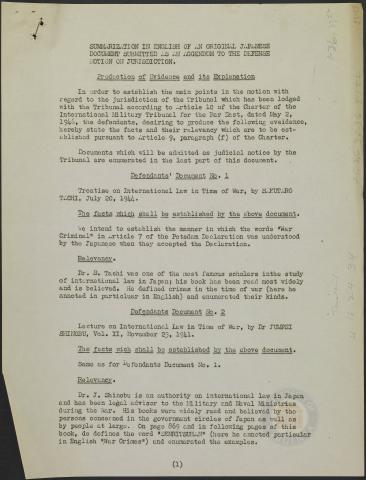
Page 1
| Parent | Summarization in English of an Original Japanese Document Submitted as an Aggendum to the Defense Motion on Jurisdiction |
|---|---|
| Date | June 1946 |
| Language | English |
| Collection | Tavenner Papers & IMTFE Official Records |
| Box | Box 3 |
| Folder | General Reports and Memoranda from June 1946 |
| Repository | University of Virginia Law Library |
SUMMARIZATION IN ENGLIHS OF AN ORIGINAL JAPANESE DOCUMENT SUBMITTED AS AN AGGENDUM TO THE DEFENSE MOTION ON JURISDICTION
Production of Evidence and its Explanation
In order to establish the main points in the motion with regard to the jurisdiction of the Tribunal which has been lodged with the Tribunal according to Article 10 of the Charter of the International Military Tribunal for the Far East, dated May 2, 1946, the defendants, desiring to produce the following evidence, hereby state the facts and their relevancy which are to be established pursuant to Article 9, paragraph (f) of the Charter.
Documents which will be admitted as judicial notice by the Tribunal are enumerated in the last part of this document.
Defendants’ Document No. 1
Treaties on International Law in Time of War, by SAKUTARO TACHI, July 20, 1944.
The facts which shall be established by the above document.
We intend to establish the manner in which the words “War Criminal” in Article 7 of the Potsdam Declaration was understood by the Japanese when they accepted the Declaration.
Relevancy.
Dr. S. Tachi was one of the most famous scholars in the study of international law in Japan; his book has been read most widely and is believed. He defined crimes in the time of war (here he annoted in particular in English) and enumerated their kinds.
Defendants Document No. 2
Lecture on International Law in Time of War, by Dr JUMPEI SHINOBU, Vol. II, November 23, 1941.
The facts which shall be established by the above document.
Same as for Defendants Document No. 1
Relevancy.
Dr. J. Shinobu is an authority on international law in Japan and has been legal advisor to the Military and Naval Ministries during the War. His books were widely read and believed by the persons concerned in the government circles of Japan as well as by people at large. On page 869 and in following pages of this book, he defines the word “SENRITSUHAN” (here he annoted particular in English “War Crimes”) and enumerated the examples.
(1)
